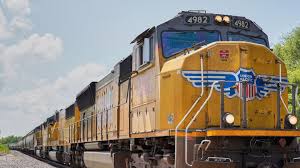Union Pacific Corporation is seeking regulatory approval for the largest U.S. rail merger in decades, and on Friday, the company announced that CEO Jim Vena met with U.S. President Donald Trump in the Oval Office to discuss the railroad’s proposed $85 billion buyout of Norfolk Southern Corp.
The July announcement of the merger between two of the four major U.S. rail operators surprised the already highly concentrated market.
Such a proposal would have been unthinkable under the Biden administration, which had an aggressive antitrust policy.
Trump and Vena discussed “how creating an American transcontinental railroad is a win for U.S. competition, consumers, and the unionized workers whose jobs will be protected when the merger is approved” during the White House meeting.
If approved, the deal could reshape the U.S. freight rail industry by creating the first coast-to-coast single-line network, streamlining operations, and eliminating interchange delays in key hubs like Chicago.
Trump’s support could expedite the lengthy review process in a deal that faces opposition from rivals and pushback from shippers worried about diminished competition.
Without naming them, Vena stated at a Morgan Stanley conference on Wednesday that he had meetings with “very senior people in the administration” the day before.
“They get it. They understand the value of what we are proposing. And they think it is an absolute win-win for the country,” Vena said during the conference.
Union Pacific sought administration input before launching its bid and received signals of support to move forward, according to those briefed on the talks.
Trump claimed on Fox News on Friday that he met with Vena because the CEO wanted to talk to him about the merger.
BOXED-IN RIVALS
Norfolk Southern is a key carrier in the East, while Union Pacific controls freight rail operations in the West. Together with BNSF Railway and CSX Corp., they make up two of the four main Class I railroads in the United States.
The industry anticipated that the two surviving regional rivals would rush to unite to fight against a continental giant in response to Union Pacific and Norfolk’s announcement of their merger.
However, last month, billionaire Warren Buffett, whose Berkshire Hathaway owns BNSF Railway, made it clear that he was not interested in purchasing another railroad, sending a strong message against further consolidation.
Rather than pursuing a merger, BNSF recently extended its commercial agreements with CSX.
In the meantime, CSX is under pressure from activist investors to change its strategy, including through possible M&A activity.
Before acting, both companies are closely monitoring how regulators react to the Union Pacific-Norfolk merger, and indications of White House support may compel Buffett to reevaluate his approach.
BNSF, which is strong in the West, and CSX, which is dominant in the East, may continue to be the only significant U.S. carriers that are not a part of a transcontinental system.
On Thursday, the White House announced that it was nominating Richard Kloster, the CEO of a private transportation consulting firm, to an available seat on the Surface Transportation Board and Michelle Schultz, a member of the board, for a new term.
Robert Primus, a Surface Transportation Board member and former President Joe Biden’s appointee, was sacked by the White House last month.
The firing was the clearest indication that the White House supported the acquisition.

















